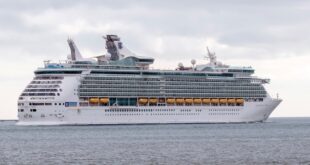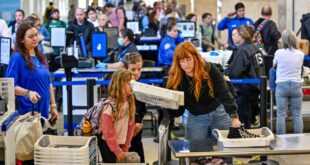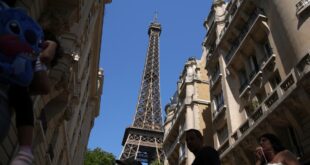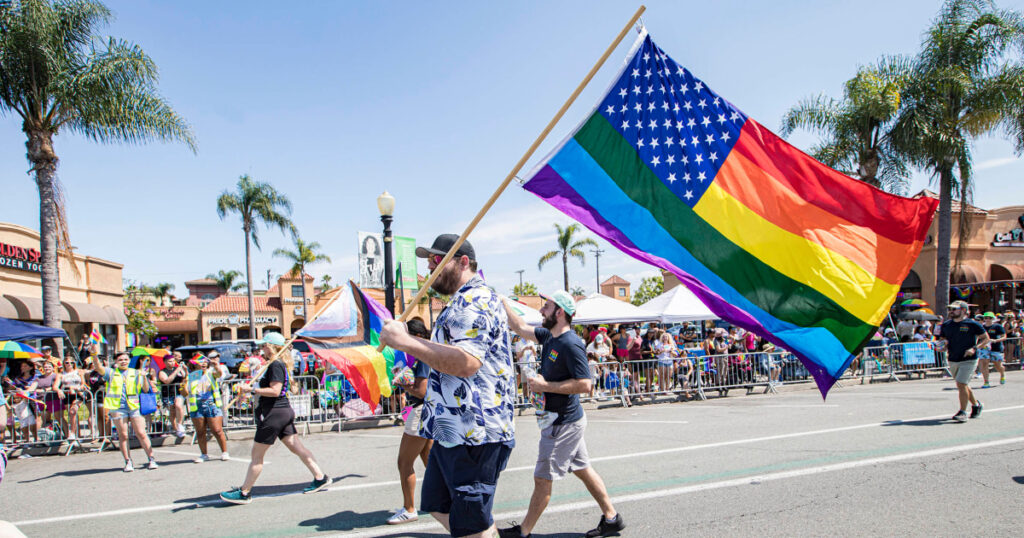
For many European gays, the festive Eurovision Song Contest each May marks the unofficial kickoff to the global Pride season.
As usual, there were soaring highlights and scandalous lowlights among the competing Eurovision nations at the 2025 edition of the contest in Basel, Switzerland, this month. But another country was on the lips of many queer jet-setters this year: the United States, with its spate of new anti-trans and anti-immigrant policies that are causing some LGBTQ travelers to reconsider their upcoming American itineraries.
Several European countries, including Denmark, Finland and Germany, have issued official cautions for LGBTQ travelers visiting the U.S., particularly those with an “X” gender listed on their passport. Meanwhile, out of concerns for participant safety, Canada’s leading LGBTQ rights group, Egale Canada, pulled out of participation in WorldPride DC, and the African Human Rights Coalition has called for a boycott of this edition of the international Pride event, coordinated by InterPride and usually held every two years.
“It doesn’t feel right to at the moment,” Karl Krause told NBC News at Eurovision in Basel, referring to travel to the U.S. Krause, who is German by birth, lives in Amsterdam with his Dutch partner, Daan Colijn, and together they are travel-focused content creators known to their followers as Couple of Men. In 2021, Lonely Planet awarded them its first Best in Travel LGBTIQ Storyteller Award, a nod to their work for the LGBTQ community.
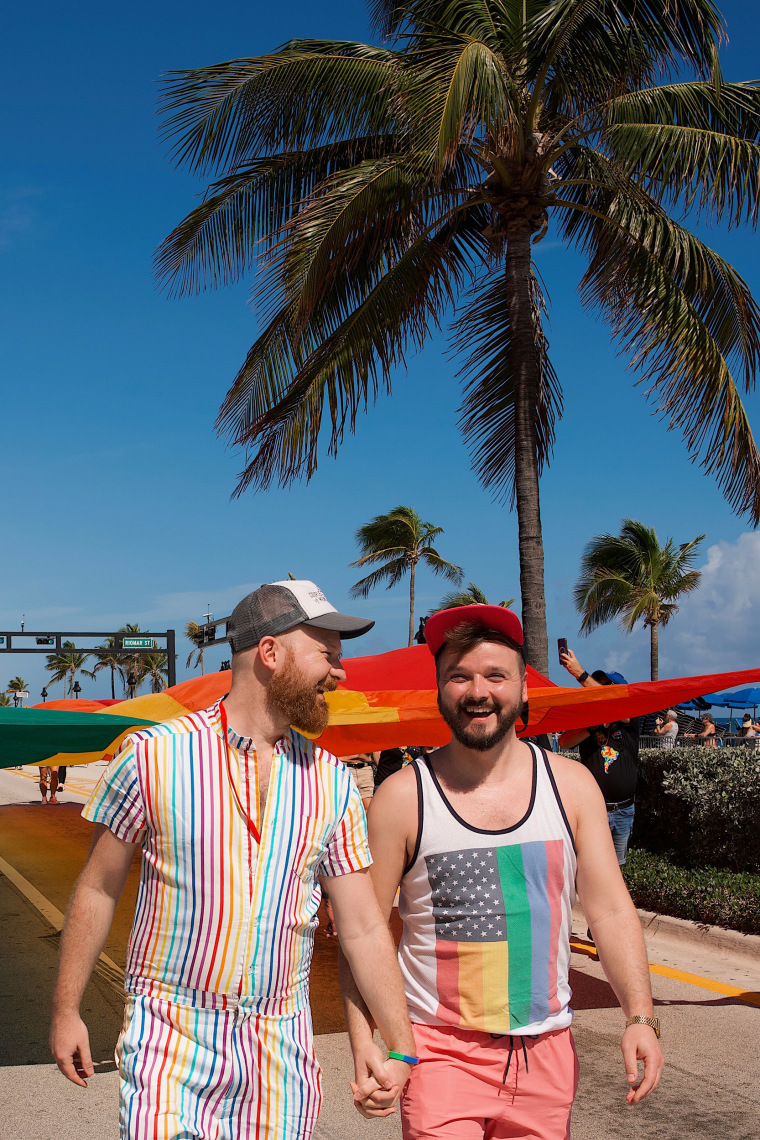
“As gay men traveling to the U.S., we are probably still the more privileged part of the community,” Krause said. “But we had some interesting conversations recently in Bilbao with a trans person who was like, ‘I cannot, I literally cannot travel to the U.S., because I have no idea how they would receive my diverse passport, if I would be put in detention or whatever. I have my little daughter — I’m not going to risk any of this.’”
Krause said that was the moment he realized that while he and Colijn as gay men may not yet be feeling the full effects of the Trump administration’s policies, they were already having an impact on other travelers within the LGBTQ community.
“So how can we in good feeling promote this destination?” he asked. “How can I send a trans friend or nonbinary friend and try to inspire them to go to the U.S. when they are in what’s supposed to be the best time of their year, to spend in a country where they don’t feel safe?”
Colijn added that he and Krause want to send their followers “somewhere where they are safe, where they feel welcome.”
“At the moment, of course a lot of people will still feel very, very welcome in the majority of America — a lot of places are still the same, or maybe even trying to do better. But we just want to be careful in what we are supporting,” Colijn said.
John Tanzella, president and CEO of the International LGBTQ+ Travel Association, or IGLTA, told NBC News that such concerns are commonplace this year.
“We’ve heard from travelers feeling uncertain about visiting the U.S., especially trans and gender-diverse individuals,” he said. “These decisions are often driven by concerns about safety, treatment at the border and access to affirming health care. Some have canceled their trips. Many others are still coming, but they’re being more selective about where they go.”
Nicoló Manfredini, an Italian trans man living in Valencia, Spain, said he was recently able to enter the U.S. without incident thanks to having an “M” marker on his passport, but the government’s anti-trans policies currently make America a place he would rather not visit again.
“Originally I had planned to go to WorldPride, but not now,” he said.
Given the current environment in the U.S., Manfredini added, he said he would only travel to the U.S. if he had to do so for work.
Even American gender-diverse people are adjusting their travel plans because of Trump administration policies, according to a study released earlier this month by the Williams Institute at the UCLA School of Law. Of the more than 300 transgender, nonbinary and other gender-diverse people surveyed, 70% said they are less likely to go on vacation to U.S. states they view as less trans-affirming.
Krause said that despite usually attending at least one and sometimes several U.S. Pride events every year, this year will be different.
“We were actually planning to go to Washington, D.C., for WorldPride, but this is off the table for us … How safe can we be in Washington? Just saying that scares me a little bit,” he said, noting the Jan. 6, 2021, attack on the U.S. Capitol was particularly concerning. “I don’t know what is going on there now and who is coming, and I don’t feel safe with the idea that I’m going there and I’m walking and maybe there is a mob [coming] from whatever direction.”
Capital Pride Alliance, the organizers behind WorldPride DC, which started earlier this month and continues through June 8, did not respond to requests for comment from NBC News, but the event’s website details security protocols and includes a passport advisory for transgender and nonbinary travelers.
Sahand Miraminy, director of operations for Capital Pride Alliance, told The Washington Post this week that security measures at WorldPride DC will include weapons screening at the entrance to the street festival June 7 and 8, which will also be fenced in.
In addition to the local and federal “agency support that we have, we also hire private security and have many forms of safety measures and surveillance that we may not share at all times with the public,” he said, “but there are certainly conversations that we’re having with those agencies on a weekly basis.”
Organizers at NYC Pride, arguably the most globally popular of U.S. Pride events each year and held like most big cities during Pride Month in June, are also stepping up security plans for 2025.
“NYC Pride has contracted a private firm with vast experience managing LGBTQIA+ events to lead on-site security,” spokesperson Kevin Kilbride said. “Given the size and visibility of our events, NYC Pride is monitored and secured by municipal agencies at every level of government to protect our freedom of expression and ensure a safe space for our community.”
 Latest World Breaking News Online News Portal
Latest World Breaking News Online News Portal


